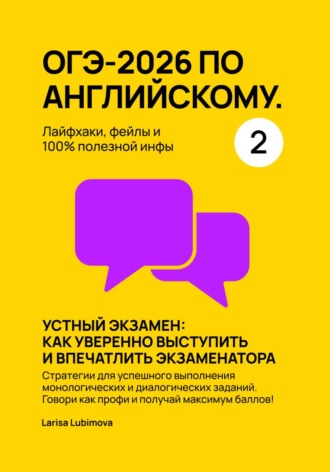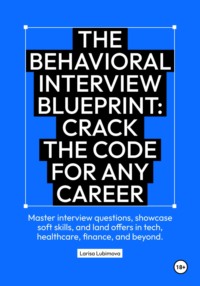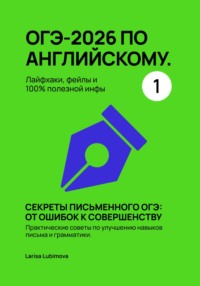
Полная версия
ОГЭ-2026 по английскому. Лайфхаки, фейлы и 100% полезной инфы. Часть 2

Larisa Lubimova
ОГЭ-2026 по английскому. Лайфхаки, фейлы и 100% полезной инфы. Часть 2
Дизайнер обложки Roman Lubimov
Устный экзамен по английскому – это как первое выступление на сцене: волнительно, но вполне реально, если знать секреты! В этой части книги вы найдете четкие инструкции и полезные лайфхаки, которые помогут превратить ваше выступление в уверенное и яркое. Здесь вы научитесь не только правильно читать тексты и отвечать на вопросы, но и структурировать свои мысли для монолога. Мы поможем вам справиться с волнением и показать свои лучшие знания. Готовы к экзамену? Давайте начнём!
Часть 1. Пошаговый разбор заданий
1.1 Чтение текста вслух
1. Требования:
– Длина текста: 130—150 слов. Это как два сообщения в мессенджере, но без эмодзи.
– Скорость чтения: «Не спринт, но и не прогулка с черепахой» – примерно 90—100 слов в минуту.
– Акцент на:
Чёткое произношение (даже если слово выглядит как случайный набор букв).
Правильные паузы (представьте, что ставите запятые там, где хотите вдохнуть).
2. Тематика текстов:
Тренды 2026:
Экология
Технологии
Образование
Спорт и здоровье
Классика жанра:
Путешествия
Хобби
Животный мир
География
1.1.1 ЛАЙФХАКИ
Лайфхаки для идеального чтения текста на экзамене:
1. «Сканируй текст до чтения»
Пробегитесь глазами по тексту за 10 секунд: найдите сложные слова, цифры, имена. Это поможет избежать неожиданных «кочек» при чтении.
2. «Разделяй и властвуй»
Длинные предложения разбивай на смысловые блоки. Например:
«The development of AI (пауза) has revolutionized education (пауза) by providing personalized learning tools.»
3. «Тренируй скороговорки»
Ежедневно произносите английские скороговорки с акцентом на проблемные звуки (например, «She sells seashells by the seashore» для «s» и «sh»).
4. «Правило 80/20 для пауз»
Делайте микропаузы перед предлогами (in, on, at) и союзами (and, but), чтобы текст «дышал».
5. «Цифры – вслух и заранее»
Если в тексте есть даты (2030) или числа (1,500), проговорите их отдельно 2—3 раза перед началом. Это снизит риск запинок.
6. «Губы-хамелеоны»
Перед чтением потренируйте артикуляцию: преувеличенно произносите гласные (aaaa, oooo) и согласные (t-t-t, k-k-k), чтобы разогреть мышцы..
7. «Шёпотом, но уверенно»
За 5 минут до экзамена прочитайте любой текст шёпотом, концентрируясь на чёткости. Это активирует речевой аппарат.
8. «Стоп-сигналы»
Если ошиблись – не возвращайтесь к началу предложения. Сделайте короткую паузу (как будто задумались) и продолжайте.
9. «Интонационный шаблон»
Для утверждений – голос слегка опускается в конце, для вопросов – поднимается. Тренируйтесь на фразах:
«This is important. (вниз) → Is this important? (вверх)»
10. «Враг монотонности»
Выделяйте голосом ключевые слова в каждом предложении. Например:
«The MAIN challenge of modern EDUCATION is…»
11. «Дыхательный ритм»
Вдыхайте в конце предложений, а не в середине. Если не хватает воздуха – разбейте предложение на части.
12. «Правило трёх R»
Перед началом:
Relax (расслабь плечи),
Read (мысленно прочти первое предложение),
Roll (сделай круговое движение языком для снятия зажимов).
Важно: Эти лайфхаки работают, только если практиковать их на реальных текстах из демоверсий 2025. Выделяйте по 15 минут в день – и к экзамену будете читать как диктор BBC (ну, почти).
1.1.2 КРАСНЫЕ ФЛАГИ
Красные флаги при чтении текста вслух (или «как испортить идеальный ответ за 2 минуты»):
1. «Скорость света»
Читать так, будто от этого зависит ваше спасение от зомби-апокалипсиса.
2. «Монотонность робота»
Произносить текст с интонацией GPS-навигатора: «Через. 500. Метров. Поверните. Направо.»
3. «Паузы? Не слышал»
Игнорировать запятые и точки. Пример: «Climatechangeisrealbutsomepeopleprefertolaughitoff…» → звучит как заклинание.
4. «Ударение-невидимка»
Случайно переносить ударение в словах: «hotEl» → «hOtel», «corrEct» → «cOrrect». Экзаменатор морщится, как от скрежета ногтей по стеклу.
5. «Иностранные слова: режим паники»
Произносить queue как «кью-ю-е», bouquet как «букет»
6. «Дыхание дракона»
Задыхаться на середине предложения, потому что вдохнули один раз в начале текста. Звуки «ххх… пффф…» становятся частью вашего выступления.
7. «Конец? Неожиданно!»
Резко обрывать последнее предложение, как будто вас выключили. Пример: «…and that’s why we need to protect the environme-».
8. «Слово-паразит в каждом абзаце»
Добавлять «эээ», «нууу» или «типа» после каждого сложного слова. «Global warming, эээ, is caused by, нууу, human activities…».
9. «Игра в исправления»
Останавливаться и повторять фразы: «In 2026… то есть, в 2025… нет, всё-таки 2026…»
10. «Шепот вампира»
Читать так тихо, будто рассказываете государственную тайну. Результат: экзаменатор переспрашивает: «Вы вообще начали?».
Как избежать: Если заметили хотя бы 3 флага из списка – сделайте паузу, глубоко вдохните и начните с последнего предложения. Даже роботы глючат, но только люди умеют это обыгрывать.
1.1.3 ЛОВУШКИ
80+ слов-ловушек с коварным произношением и ударением (или «где спотыкаются даже уверенные в себе»):
1. Города, страны и бренды:
1. Edinburgh → ['edɪnbrə] (Эдинбрə)
2. Worcestershire → ['wʊstərʃər] (Вустершир).
3. Leicester → ['lɛstər] (Лестер)
4. Arkansas → ['ɑ:rkənsɔ:] (Аркансо, штат).
5. Versailles → [vɛr'saɪ] (Версай)
6. Nike → ['naɪki] (Найки)
7. IKEA → [ɪ'keɪə] (Икея)
8. Adobe → [ə'doʊbi] (Эдоуби)
9. Hyundai → ['hʌndɛɪ] (Хандей)
10. Hermès → [ɛr'mɛz] (Эрмез)
попробуй теперь прочитать:
A Tour Through the World of Tricky Names
Welcome to a journey where pronunciations surprise!
Edinburgh – fairies stole the «g», so it’s not «Edingburgh». Say «burg» and face bagpipes!
Worcestershire – trolls ate half the letters. Order the sauce with the full name and get water.
Leicester – lost its «ei» and «che». Ask for «Leicester» and visit the missing vowels museum.
In Arkansas, «zas» became «so». Say «Arkansas» and cowboys will make you clean boots. At Versailles, mirrors whisper: «We say „Versailles“, or King Louis will appear with a comb!»
Don’t forget Nike, IKEA, Adobe, Hyundai, and Hermès – each has its own pronunciation magic!
2. Научные/технические термины:
11. Algorithm → ['ælɡərɪðəm] (Алгоритм)
12. Cache → [kæʃ] (Кэш).
13. Hyperbole → [haɪ'pɜ:rbəli] (Хайперболи)
14. Epitome → [ɪ'pɪtəmi] (Ипитоми)
15. Quinoa → ['ki:nwɑ:] (Кинва)
16. GIF → [dʒɪf] (Джиф) – не «Гиф» (спорно, но создатель настаивает!).
17. Linux → ['lɪnəks] (Линукс)
18. Data → ['deɪtə] (Дейтə)
19. Privacy → ['praɪvəsi] (Прайвэси)
20. Meme → [mi:m] (Мим)
попробуй теперь прочитать:
The Price of Ignorance
In a quantum computing lab, the air crackled with tension. Engineer Mark rushed to fix a server crashed by an error in the Algorithm. «Clear the Cache,» he muttered, pronouncing it «ka-che.» The system screeched. Screens flashed with Hyperbole – but Mark read it as «hi-per-bowl.»
The walls trembled. Distorted voices echoed: «Hyperbole became real.» The floor stretched like rubber, and the ceiling crashed down – literally.
Fleeing, Mark grabbed a book labeled Epitome, misreading it as «epi-tome.» The book came alive, pages turning into tentacles. He escaped, stumbling into a food storage. «At least Quinoa will help,» he thought, saying «kwin-oh-ah.» Grains swelled into toxic bubbles, hissing: «KEEN-wah!»
Desperate, he booted Linux, shouting «lie-nux!» The terminal exploded, engulfing him in static.
Moral: Mispronounce technical terms – and reality may rewrite itself.
3. Слова-«обманки»:
21. Colonel → ['kɜ:rnəl] (Кёрнл)
22. Drought → [draʊt] (Драут)
23. Bologna → [bə'loʊni] (Болони)
24. Facade → [fə'sɑ:d] (Фасад).
25. Debris → [də'bri:] (Дебри).
26. Queue → [kju:] (Кью)
27. Aisle → [aɪl] (Айл)
28. Island → ['aɪlənd] (Айленд)
29. Subtle → ['sʌtl] (Сатл)
30. Rendezvous → ['rɑ:ndeɪvu:] (Рандейву)
попробуй теперь прочитать:
The Linguistic Nomads
Words, like restless travelers, cross borders and shed accents. Take colonel – a vagabond from Italian colonello («column leader»). It wandered through French, where scribes misspelled it coronel, and English tongues, torn between spelling and sound, forged a truce: «Kernel.»
Then came rendezvous, a French phrase meaning «present yourselves.» English sailors adopted it for secret meetings but trimmed its vowels to «Ron-day-voo,» as if squeezing a Parisian ballad into a sea shanty.
Bologna, the Italian city, arrived as mortadella. But in American delis, it shed its syllables, becoming «Buh-lo-nee» – a meaty metamorphosis.
Debris, born from French débris («broken pieces»), kept its silent «s’ like a smuggled jewel. English mouths reshaped it to «Day-bree,» turning rubble into melody.
These words, forever foreign yet fiercely local, remind us: language is a borrowed coat, stitched with the threads of a hundred tongues.
4. Омонимы и паронимы:
31. Lead (металл) → [lɛd] (Лед) vs. lead (вести) → [li:d] (Лиид).
32. Tear (слеза) → [tɪr] (Тир) vs. tear (рвать) → [teər] (Тэар).
33. Wind (ветер) → [wɪnd] (Уинд) vs. wind (крутить) → [waɪnd] (Вайнд).
34. Bass (рыба) → [bæs] (Бэс) vs. bass (бас-гитара) → [beɪs] (Бейс).
35. Desert (пустыня) → ['dezərt] (Дезерт) vs. dessert (десерт) → [dɪ'zɜ:rt] (Дизёрт).
36. Bow (поклон) → [baʊ] (Бау) vs. bow (бант) → [boʊ] (Боу).
37. Row (ряд) → [roʊ] (Роу) vs. row (ссора) → [raʊ] (Рау).
38. Live (жить) → [lɪv] (Лив) vs. live (в прямом эфире) → [laɪv] (Лайв).
39. Close (близкий) → [kloʊs] (Клоус) vs. close (закрыть) → [kloʊz] (Клоуз).
40. Object (объект) → ['ɑ:bdʒekt] (Обджект) vs. object (возражать) → [əb'dʒekt] (Обджект).
попробуй теперь прочитать:
Homophonic Havoc
In the quaint town of Lexington, a series of amusing misunderstandings unfolded due to homophones.
Young Lead – a budding chemist – decided to lead a lab tour. «This lead is toxic!» he warned, pointing to a metal sample. Visitors, hearing «lied,» thought he was sharing marketing secrets and bombarded him with business questions.
At the lake, an angler caught a bass, boasting, «What a magnificent bass!» A passerby admired his guitar, replying, «Yes, bass here is legendary!» The fisherman nodded proudly, unaware of the musical confusion.
In «Dessert Oasis,» a waitress served a customer dessert – sand and cactus on a plate. «I ordered cake, not desert!» he exclaimed. She stammered, «Sorry, today’s dessert-illusion!»
Outside, an artist drew a bow on a lady’s hat. She curtsied, saying, «Thank you for the elegant bow!» He smiled, thinking she admired his drawing, while she mistook it for a gesture.
These linguistic mix-ups reminded everyone: in English, even a close friend might close the door on you – if you don’t watch your wind (or wind up in a row over a row of seats).
5. Заимствования из других языков:
41. Faux pas → [foʊ ’pɑ: ] (Фо па)
42. Cliché → [kli:'ʃeɪ] (Клишэй)
43. Genre → ['ʒɑ:nrə] (Жанрə)
44. Coup → [ku:] (Ку)
45. Croissant → [krwɑ:'sɑ̃:] (Круассан)
46. Schadenfreude → ['ʃɑ:dənfrɔɪdə] (Шаденфройдэ)
47. Tsunami → [tsu:'nɑ:mi] (Цунами)
48. Bourgeois → [bʊr'ʒwɑ:] (Буржуа)
49. Fiancé (e) → [fi'ɑ:nseɪ] (Фиансей)
50. Resume (резюме) → ['rɛzəmeɪ] (Резюмей)
попробуй теперь прочитать:
Linguistic Ambassadors
English is a melting pot of languages, and some words bring their cultural baggage – including tricky pronunciations. Take faux pas, the French «false step.» Mispronouncing it as «fox pass» is like tripping over a queen’s train. Then there’s cliché, another French gift. Saying «cliche» instead of «klishey» feels like printing a masterpiece on a broken press.
Genre kept its French grace – the soft «zh» is a nod to Parisian politeness. Imagine discussing ballet in wooden shoes if you say «jenre»! Coup («koo») dashed in from French too. «Cope» would turn a palace coup into a spat over a coffee cup. Croissant, meaning «crescent,» becomes «cri-san» – evoking medieval hardtack, not flaky pastry.
From German comes schadenfreude. Pronouncing it «shad-en-froo-day» reads like a typo in a philosophy essay. Tsunami sailed in from Japanese – «tsu» (bay) + «nami» (wave). Bourgeois («boo-zhwa») sounds like a botched opera aria if you say «bur-goy-ee.» Fiancé (e) («fee-ahn-say») preserves French romance – «fee-ans» makes wedding vows sound like math. And resume («rez-uh-may») insists on its nasal vowels – «re-zume» turns career goals into a nursery rhyme.
Correct pronunciation isn’t just phonetics; it’s a homage to a word’s history. Mispronouncing them is like serving croissants with ketchup – technically possible, but culturally jarring.
6. Слова с «немыми» буквами:
51. Knight → [naɪt] (Найт) – «k» и «gh» молчат.
52. Psychology → [saɪ'kɑ:lədʒi] (Сайкалоджи) – «p» немая.
53. Wednesday → ['wenzdeɪ] (Уэнздей) – «d» не слышно.
54. Receipt → [rɪ'si:t] (Рисит) – «p» немая.
55. Salmon → ['sæmən] (Сэмэн) – «l» не читается.
56. Muscle → ['mʌsl] (Массл) – «c» немая.
57. Debt → [dɛt] (Дет) – «b» немая.
58. Lamb → [læm] (Лэм) – «b» немая.
59. Castle → ['kæsl] (Касл) – «t» немая.
60. Listen → ['lɪsən] (Лисн) – «t» немая.
попробуй теперь прочитать:
The Great Letter Escape
Long ago, letters in English loved to be heard. The k in knight roared like a dragon, the l in salmon sang like a river, and the p in psychology popped like a cork. But humans grew lazy.
One stormy Wednesday, the letters gathered in a castle. «They ignore us!» cried the b in debt. «I’m stuck in «lamb’ but never spoken!» whined the b. The t in castle added, «I’m trapped in stone walls – no one says me!»
The p in receipt proposed a rebellion: «Let’s vanish! If they won’t say us, we’ll become ghosts!» The letters agreed. The k in knight fled first, leaving the word lighter. The l in salmon slipped into the sea, and the t in listen dissolved into silence.
But the c in muscle hesitated. «What if they need us later?» The p in psychology scoffed, «They’ll stress about it anyway!»
Centuries passed. Humans forgot the letters ever existed. Now, when someone says «k-night» or «sal-mon», the ghosts of the letters giggle in the shadows. Moral: Laziness has consequences… and a silent prankster in every word.
7. Сложные ударения:
61. Applicable → [ə'plɪkəbl] (Эпликэбл)
62. Category → 'kætəɡɔ:ri (Кэтэгори)
63. Event → ɪ'vent (Ивэ́нт)
64. Mischievous → 'mɪstʃɪvəs (Ми́счивэс)
65. Recipe → 'resəpi (Рэсэпи).
66. Syllable → 'sɪləbl (Си́лэбл)
67. Vocabulary → və'kæbju:ləri (Вакабьюлэ́ри)
68. Envelope → 'ɑ:nvəloʊp (А́нвэлоп – амер.) / 'envəloʊp (Энвэлоп – брит.)
69. Finance → 'faɪnæns (Фа́йнэнс) (в глаголе ударение смещается: fi'næns).
70. Laboratory → lə'bɒrətəri (лабо́рэтри) – в британском английском ударение на второй слог, а не «ла́боратори»
попробуй теперь прочитать:
The Accent Adjustment
In the university laboratory, Emma nervously reviewed her vocabulary notes. «This recipe for chemical solutions has too many syllables,» she groaned, stressing the second syllable of «la-BO-ra-tory» like her British professor insisted.
Her friend Liam, ever mischievous, tossed an envelope at her. «Your finance report’s due. And it’s „FIE-nance,“ not „fi-NANCE“ when it’s a noun,» he teased, dodging her glare.
«Applicable theory goes in category three,» interrupted Dr. Carter, eyeing Liam’s chaotic desk. «Not „a-PLI-ca-ble,“ Emma. Think „apple,“ then „icable.“»
That evening, at a charity event («ee-VENT, not EH-vent,» Liam mimicked), Emma met a French exchange student. «Your envelope,» he said, handing her a lost letter, «it’s «ON-velope’ here, no?»
«In America, yes,» she laughed. «But in my lab, it’s all «la-BO-ra-tory’ debates and recipe disasters.»
«Ah,» he grinned, «a mischievous category of problems.»
As fireworks lit the sky, Emma realized language wasn’t just about rules – it was about the joy of untangling its quirks, one stressed syllable at a time.
8. Современные термины (2026):
71. NFT → [ɛn ɛf ti] (Эн-Эф-Ти)
72. Metaverse → ['metəvɜ:rs] (Метэвёрс).
73. Cryptocurrency → [’krɪptoʊkɜ: rənsi] (Криптоукёрэнси)
74. Biodegradable → [baɪoʊdɪ'ɡreɪdəbl] (Байоудигрэйдэбл)
75. Sustainability → [səsteɪnə’bɪləti] (Сэстэйнабилэти)
76. AI-driven → [eɪ aɪ 'drɪvn] (Эй-Ай-Дривн)
77. Carbon footprint → ['kɑ:rbən 'fʊtprɪnt] (Карбэн Футпринт)
78. Blockchain → [’blɒktʃeɪn] (Блокчейн)
79. Deepfake → ['di:pfeɪk] (Дипфейк).
80. Hashtag → ['hæʃtæɡ] (Хэштэг)
попробуй теперь прочитать:
The Future’s Vocabulary
At a metaverse conference, Victor frantically adjusted his presentation. «Our NFT isn’t just an «nift’ – it’s a digital masterpiece!» he muttered, while his colleague Katya skeptically clicked through cryptocurrency transactions on her wallet.
At the «biodegradable» booth, eco-activist Lisa sighed: «People confuse it with «biodegradabl’ – as if it’s not compost, but a tech disaster.» Nearby, student Max argued with a promo robot: «Your AI-driven algorithm isn’t «ai-driven,» it’s just a template!»
In the sustainability panel, Dr. Patel corrected a journalist: «Sustainability is „sustain-uh-bil-ity,“ not „sustainability.“» Meanwhile, a startup founder pitched his blockchain project, clarifying: «It’s „blok-cheyn,“ not „block-chain.“»
A social media influencer struggled with her post: «hashtag trends aren’t about „hash-tag,“ they’re about engagement!» While a tech reviewer debated deepfakes: «It’s „deep-fake,“ not „deep-fak,“ and it’s reshaping trust.»
As the conference buzzed, attendees grappled with carbon footprint calculations. «It’s „car-ben foot-print,“» a consultant reminded, pointing to an infographic. Amid the chaos, one thing was clear: mastering the language of tomorrow was as crucial as the innovations themselves.
9. Слова с ударениями, меняющими часть речи:
81. REcord (сущ. – рекорд) vs. reCORD (глагол – записывать)
82. CONtract (сущ. – контракт) vs. conTRACT (глагол – сокращаться)
83. PREsent (сущ. – подарок) vs. preSENT (глагол – представлять)
84. PROject (сущ. – проект) vs. proJECT (глагол – проецировать)
85. OBject (сущ. – предмет) vs. obJECT (глагол – возражать)
86. CONduct (сущ. – поведение) vs. conDUCT (глагол – проводить)
87. REbel (сущ. – бунтарь) vs. reBEL (глагол – бунтовать)
88. PERmit (сущ. – разрешение) vs. perMIT (глагол – разрешать)
89. DEsert (сущ. – пустыня) vs. deSERT (глагол – покидать)
90. CONflict (сущ. – конфликт) vs. conFLICT (глагол – противоречить)
попробуй теперь прочитать:
The Stressful Symphony of Syllables
Mr. Higgins, a high school English teacher, decided to preSENT a PREsent to his class: a crash course on stress. «Today, we conDUCT a lesson on CONduct!» he announced.









